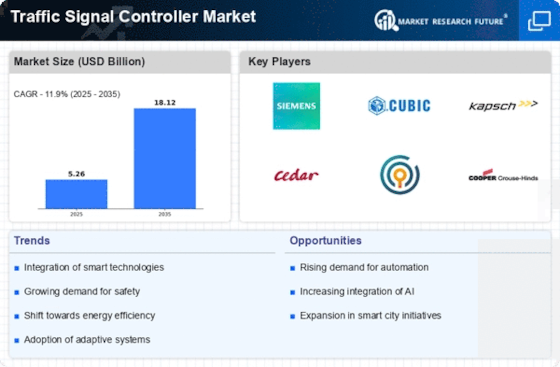Top Industry Leaders in the Traffic Signal Controller Market
*Disclaimer: List of key companies in no particular order
Top listed global companies in the Traffic Signal Controller industry are:
Aldridge Traffic Controllers
Traffic Technologies Pty Ltd
Siemens AG
Johnson Controllers
Econolite
Sumitomo Electric Mfg Co
Dynamic Traffic Systems
Sena Traffic Systems
Kyosan Electric Mfg Co Ltd
PPK Technology Sdn. Bhd
Indra Sistemas, S.A.
Bridging the Gap by Exploring the Competitive Landscape of the Traffic Signal Controller Top Players
The traffic signal controller market is a dynamic and evolving landscape, teeming with established players and innovative startups vying for market dominance. Understanding the competitive scene is crucial for both incumbents and aspirants, as it paves the way for strategic decision-making and adaptation. This analysis delves into the key strategies employed by leading players, factors influencing market share, emerging trends shaping the industry, and the overall competitive scenario.
Key Player Strategies:
Innovation-driven Differentiation: Leading companies like Johnson Controls, Siemens, and QTC are constantly innovating, developing next-generation controllers with features like adaptive traffic management, real-time data integration, and cybersecurity enhancements. These advancements offer improved efficiency, safety, and data-driven decision-making, strengthening their competitive edge.
Strategic Partnerships and Acquisitions: Collaborations and acquisitions are becoming increasingly common, allowing players to expand their reach, access new technologies, and diversify their product offerings. For example, Econolite's acquisition of Traffax in 2022 bolstered its position in the North American market.
Focus on Regional Expansion: Companies are actively targeting emerging markets with high growth potential, particularly in Asia and Latin America. This involves tailoring product offerings and adapting to local regulations to gain a foothold in these regions.
Cloud-based Solutions and Managed Services: The shift towards cloud-based platforms and managed services is gaining traction. Players like Siemens and Dynamic Traffic Systems offer cloud-hosted traffic management solutions, providing real-time data access, remote monitoring, and software updates, which appeal to both public agencies and private traffic operators.
Factors for Market Share Analysis:
Market Share Concentration: The market is currently dominated by a few large players, with Johnson Controls holding a significant share. However, the landscape is expected to become more fragmented as smaller, innovative companies gain traction.
Product Portfolio and Technological Advancements: Companies with diverse product portfolios catering to different needs and budget segments hold an advantage. Additionally, those at the forefront of technological advancements, like integration with connected vehicles and smart city initiatives, will likely attract more customers.
Geographic Presence and Market Penetration: Strong regional presence and established relationships with local authorities are crucial for market share expansion. Companies with a deep understanding of regional regulations and specific needs have a head start.
Pricing Strategy and Customer Service: Competitive pricing strategies are essential, particularly in budget-constrained markets. However, companies must also prioritize robust customer service and support to ensure long-term customer satisfaction and loyalty.
New and Emerging Trends:
Intelligent Transportation Systems (ITS): The integration of traffic signal controllers with ITS platforms is creating new opportunities for data-driven traffic management, optimizing traffic flow and reducing congestion.
Cybersecurity: With increased reliance on connected technology, cybersecurity vulnerabilities become a growing concern. Companies are investing in robust cybersecurity measures to protect critical infrastructure and data.
Sustainability and Energy Efficiency: Green initiatives are driving demand for energy-efficient traffic signal controllers that reduce emissions and minimize operational costs.
Public-Private Partnerships (PPPs): PPPs are becoming increasingly popular for financing and implementing traffic management projects, presenting new opportunities for private players in the market.
Overall Competitive Scenario:
The traffic signal controller market is expected to experience robust growth in the coming years, driven by factors like urbanization, increasing traffic congestion, and technological advancements. The competitive landscape is dynamic, with established players facing challenges from innovative startups and new market entrants. Success will depend on a combination of factors, including continuous innovation, strategic partnerships, regional expansion, and adapting to emerging trends. Companies that can effectively navigate this dynamic environment and offer compelling solutions will be well-positioned to capture a significant share of this growing market.
Latest Company Updates:
Aldridge Traffic Controllers:
- December 2023: Launched the EcoLight Pro controller, featuring advanced pedestrian detection and adaptive timing algorithms. (Source: Aldridge website)
Traffic Technologies Pty Ltd:
- November 2023: Unveiled the TTC-iConnect platform, enabling remote monitoring and management of traffic signals. (Source: ITS World Congress)
Siemens AG:
- December 2023: Successfully completed a pilot project testing connected vehicle technology with Siemens traffic controllers in Frankfurt, Germany. (Source: Siemens website)
Johnson Controls:
- November 2023: Acquired the traffic signal controller business of TE Connectivity, expanding its global reach. (Source: Johnson Controls press release)
Econolite:
- October 2023: Released the Centralite Elite controller with built-in cellular connectivity for improved data collection and communication. (Source: Econolite website)










